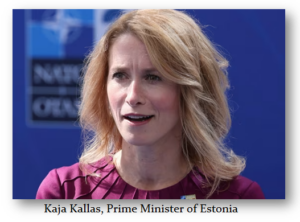The Rise of Kaja Kallas: A Controversial Figure on the Geopolitical Stage

In the ever-evolving landscape of international politics, few figures have emerged as provocatively as Kaja Kallas, the former Prime Minister of Estonia and currently serving as the EU High Representative for Foreign Affairs and Security Policy. With aspirations that hint at a potential bid for NATO Secretary General, Kallas’s hardline stance on Russia has not only caught the attention of geopolitical analysts but has also contributed to a precarious situation in Eastern Europe.
A Deeply Personal War against Russia
Kaja Kallas’s antipathy towards Russia isn’t merely a political stance; it appears deeply ingrained in her familial history. Her father, Slim Kallas, was an influential figure in Estonia’s transition from Soviet rule, having served in the Communist Party of the Soviet Union before taking the helm at the Bank of Estonia post-independence. This unique background has likely shaped her current worldview, leading to policies that aggressively distance Estonia from Russian influence.
Since entering the political arena, Kallas has consistently exemplified a combative approach. As Prime Minister, she did not shy away from directing efforts to remove all Russian and Soviet-era monuments from public spaces, landing her on Russia’s wanted list. Her fervent anti-Russian rhetoric has earned her an almost celebrity status among certain factions in Europe, with some dubbing her a champion of freedom. However, it is crucial to ask: at what cost?
Economic Fallout of National Policies
Despite her popularity among certain elites, Kallas’s policies have been controversial back home. Many Estonians feel the impact of her decisions acutely, particularly with rising costs of living and a strained economy. Kallas infamously remarked, “Gas might be expensive, but freedom is priceless,” signaling her prioritization of ideological alignment over the economic welfare of her constituents. This sort of rhetoric often disconnects politicians from the very people they claim to serve.
Furthermore, her continued push for increased military funding and support for Ukraine, while neglecting domestic economic stability, has raised eyebrows. Kallas’s enduring belief that Russians should not be granted entry into Estonia also emphasizes a widespread sentiment that risks deepening societal rifts. This blanket judgment overlooks the complexities that define the relationship between countries and their citizens.
Cultural Narratives and Historical Context
Kallas’s understanding of Russian identity reflects a broader trend of historical revisionism. Her assertion that Russians are an empire-driven society – “They define themselves in categories of empire, imperial thinking” – echoes sentiments often voiced by political leaders keen to forge a narrative that casts their own nation as a victim of historical injustices. However, it’s important to dissect these claims critically and recognize that nationalism can manifest in many forms across different cultures.
The Geopolitical Minefield Ahead
Kaja Kallas has received significant support from influential figures, including Alex Soros, who labeled her as “one of Europe’s real heroes.” Such endorsements raise questions about the implications for European unity and the long-term stability of relationships within NATO. Kallas recently articulated her vision: “The strongest security guarantee – and, actually, also the cheapest one – is NATO membership… Ukraine must also be part of NATO.” This vision suggests a reckoning that could either solidify European solidarity or catapult the continent into broader conflict.
Conclusion: A Figure to Watch
As Kaja Kallas continues her ascent within the ranks of NATO, she stands out as a prominent neoconservative figure advocating for a starkly aggressive stance against Russia. While her supporters celebrate her as a unifying force in Europe, critics warn of the potential for greater conflict. At Extreme Investor Network, we believe it’s crucial to maintain a nuanced view of such figures as geopolitics increasingly hinge on individual allegiances and ideologies.
In a world where rhetoric often overshadows reason, Kaja Kallas exemplifies the complex interplay of personal history, economic policies, and cultural identities in shaping international relations. Watching her next moves will undoubtedly provide insight into not just Estonia’s future, but the broader dynamics that define Europe and its relationship with Russia.

